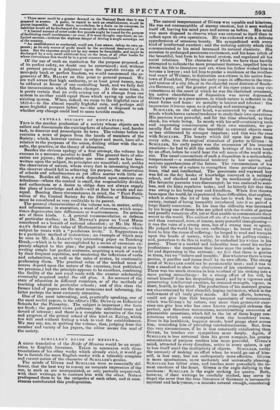CENTRAL SOCIETY OF EDUCATION.
THIS is the maiden production of a society whose objects are to collect and disseminate the existing facts of education ; and, harder task, to discover and promulgate its laws. The volume before us contains a score of papers from the hands of members of the Society; which, however various in subject and merit, have all a relation to the purposes of the union, dealing either with the re- sults, the practice, or the theory of education.
Besides the obvious apology of a first attempt, the volume has excuses in a measure peculiar to itself. The general facts of edu- cation are jejune ; the particular are saute: much as has been written upon the subject, its principles are unsettled; and, unlike the observation of nature, where every fact is interesting though the observer should fail in achieving his purpose, the observation of schools and schoolmasters as yet offers matter with little at- traction. Besides all this, a work dependent upon amateur con- tributions—where the control is small, the responsibility divided, and enthusiasm or a desire to oblige does not always supply the place of knowledge and skill—will at first be crude and un- equal. Bearing these circumstances in mind, the " First Publi- cation of the Central Society for the Diffusion of Education " must be considered as very creditable to its parent.
The general characteristics of the volume are, in matter, utility and information ; in execution, a want of closeness, which some- times degenerates into diffuseness or wearisomeness. Its articles are of three kinds. I. A general recommendation or defence of particular studies; as Dr. Mowee's paper on Vocal Music considered as a branch of national education ; or Mr. DE MOR- GAN'S defence of the value of Mathematics in education,—which subject he treats with a " ponderous levity." 2. Suggestions as to a particular method of instruction ; an example of which may be seen in Mr. A. ALLEN'S very interesting paper on Teaching Greek,—which is to be accomplished by a series of exercises ex- pressly adapted to this plan ; the pupil commencing at once by writing simple but perfect sentences, acquiring a stock of words by their frequent repetition, and mastering the inflexions of verbs and substantives, as well as the rules of syntax, by continually performing them. The practical value of the method must of course depend upon the nature of the exercises, (not published, we presume,) but the principle appears to be excellent, combining the facility of the new royal roads with the exacter scholarship eventually acquired under the old plan. 3. An account of the state of education in different countries, or of the methods of teaching adopted in particular schools ; and of this class the former kind of papers are the most numerous and informing, the latter perhaps the most curiously attractive.
One of the most interesting, and, practically speaking, one of the most useful papers, is the editor's (Mr. DUPPA) on Industrial Schools for the Peasantry. The subject is important ; the facts are fresh ; the general views judicious; the individual cases not devoid of interest ; and there is a complete narrative of the rise and progress of the primal school of this kind at Ealing, which few will read without feeling a wish to visit the establishment. We may say, too, in quitting the volume, that, judging from the number and variety of his papers, the editor seems the soul of the society.


























 Previous page
Previous page